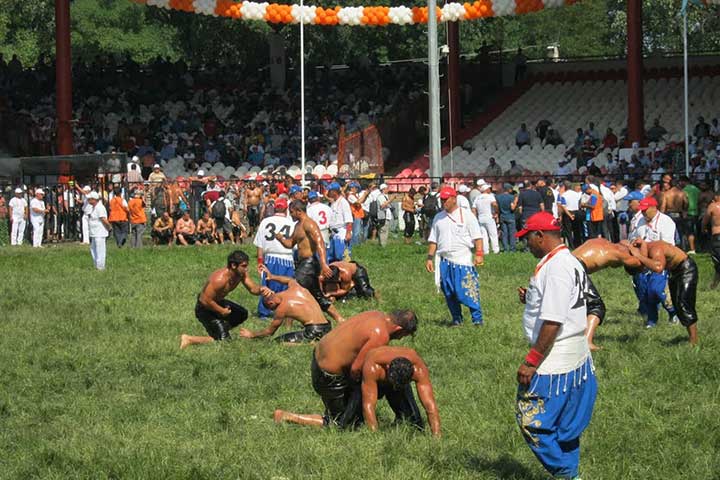“Allah Allah illalah
May we prosper
Our patron is Hamza the wrestler
Our ancestors were wrestlers
Two valiant men take the field
One blond one dark
Both seek the prize
Do not despair when down
Do not boast when uppermost
When above do not let go
Meet leg trip with leg trip
Send a prayer to Muhammed
I hastened to the spring
May God be with both of you.”
For 630 years, the celebrated Kirkpinar oil wrestling tournament has commenced with this chant. The master of the festival, known as the cazgir, recites a prayer for the wrestlers. Then the drums zurna (a wind instrument with a double reed) begin to play, hundreds of wrestlers bow in salute, and the first pairs lock in combat on the green meadow.
There are several versions of the story about how the Kirkpinar wrestling tournament began, the best known relating how Sultan Murad I’s general Suleyman Pasa crossed the Dardanelles with a vanguard of forty warriors on two rafts and commenced the march through Thrace. At every halt, the men engaged in wrestling bouts as a way of forgetting the hardships of the journey. One day when they reached a meadow at Ahirkoy near Edirne they began wrestling as usual. As the sun set only two wrestlers remained, neither able to inflict defeat on the other. They continued to wrestle into the night until finally both collapsed and died of exhaustion. They were buried where they fell, and the next day a spring of crystal clear water appeared on the spot.
This meadow was thereafter known as Kirkpinar or the Forty Springs in memory of the first Turkish warriors to set foot on European soil.
The historian Osman Nuri Peremeci writes in his history of Edirne that a Wrestlers Lodge was established in Edirne soon afterward and that here the local wrestlers held matches twice a week during the winter. But in summer, they wrestled outdoors in the flat meadows near the city.

During the spring festival of Hidrellez, a three-day tournament was held on the meadow of Kirkpinar, which is situated today near the village of Samona over the frontier in Greece. Famous wrestlers from all over the Ottoman lands would gather here for the event, and the Wrestlers Lodge would provide food and accommodation for the contestants. Today, the Kirkpinar Oil Wrestling Tournament is still held annually at Sarayici in Edirne.
The 17th-century writer Evliya Celebi’s description of the tournament in his travels begins:
One hundred to one hundred and fifty pairs of wrestlers gird their leather trousers and fifty pairs of wrestlers gird their leather trousers and oil themselves with yellow butter. Then legs a straddle like human dragons they grasp one another with the strength of lions and display their skills to the spectators.
Today, hundreds of wrestlers from all over Turkey who have been preparing for the tournament over the previous year, pour into Edirne for this festive event. Just as they have been for centuries, makeshift restaurants, coffee houses, stalls, and funfairs are set up Sarayici.
The mood at the wrestling field itself is one of intense excitement. Wrestlers wearing the traditional tight pants made of calf or goat’s leather oil their bodies not with the butter of yesteryear, but with olive oil poured in ewers from huge cauldrons.
The event begins with the ceremonial auction of a ram to the highest bidder, who becomes the master of that year’s tournament. After the opening prayer, the loud rhythmic sound of drums and zurnas breaks out and the wrestling commences. The monotonous music is exhilarating, and the spectators begin to identify with the losers and sharing the thrill of victory with the winners. The scene takes on a dreamlike unreality, all other sounds eliminated by the relentless beat of the music. For three days the wrestling field is never empty. If enthusiasm shows any sign of waning the musicians switch to a faster rhythm.
The eleven classes of oil wrestling run from the lowest known as tesvik (encouragement) up to the highest known as bas guresler (head wrestling). All the wrestlers struggling to come first in their class also aspire to become one of the baspehlivan, or master wrestlers.
The matches between the baspehlivan take place on the last day, when excitement soars to a climax as the losers are eliminated, finally leaving the last two contestants alone on the field to wrestle for the gold belt. The championship fight may last many hours.
The saying goes that a defeated wrestler is never satiated, and as the losers leave Sarayici their parting words are inevitable:
See you at Kirkpinar next year!


